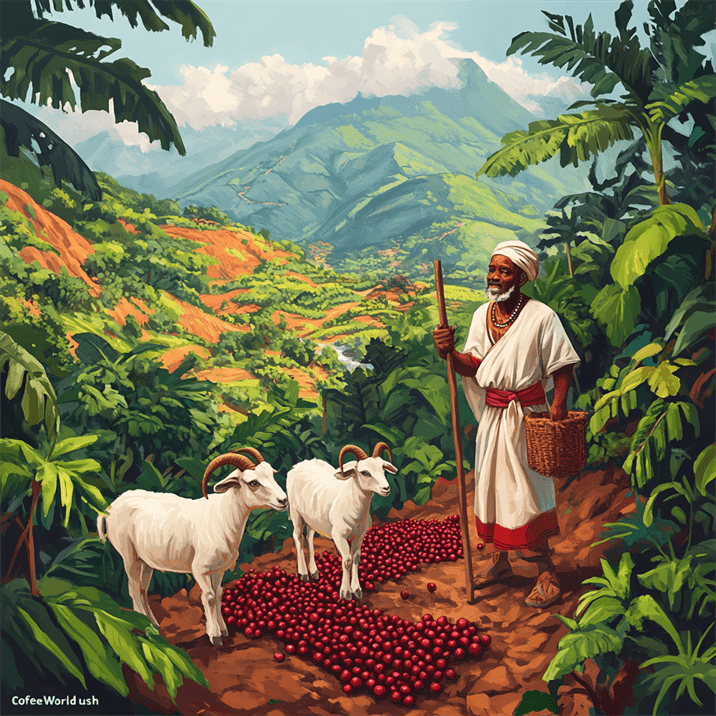The Remarkable Origins of Coffee: A Journey from Myth to Global Commodity
Table of Contents
The Origins of Coffee: A Journey Through Time
History of Coffee, the beloved beverage that energizes millions across the world each morning, has a rich and mysterious history. Though no one knows the exact date or individual responsible for its invention, the origins of coffee can be traced back over a thousand years to ancient Ethiopia. From there, it spread across the globe, eventually becoming one of the most popular drinks worldwide. But how did coffee go from being a simple plant to the essential part of daily life that it is today?
The Story of Kaldi and the Discovery of Coffee
One of the most popular legends surrounding the discovery of coffee involves an Ethiopian goat herder named Kaldi. According to the tale, Kaldi noticed his goats became unusually energetic after eating the berries from a particular tree. Intrigued by the effect, he decided to try the berries himself and felt a similar surge of energy.Kaldi shared his discovery with a local monk, who brewed a drink from the berries to stay awake during long prayers. This simple act of brewing led to the first known use of coffee as a stimulant.
Though the story of Kaldi is likely apocryphal, it represents the beginnings of coffee’s journey into human culture. The first written references to coffee appear in the 9th century, when Arab traders began to cultivate the coffee plant in the region that is now Yemen, in the Arabian Peninsula.
Coffee Cultivation and the Arabian Trade
By the 15th century, coffee had found a home in the Arabian world, particularly in Yemen. Sufi monks, who sought to stay alert during their late-night prayers, began using coffee as a drink to help them remain awake. The coffee trade flourished, and coffeehouses, known as qahveh khaneh, became popular social hubs where people gathered to discuss politics, literature, and philosophy.
The coffee plant itself, Coffea arabica, originates from Ethiopia, but its cultivation was perfected in Yemen, where it thrived in the region’s dry, mountainous terrain. By the 16th century, coffee began to spread across the Islamic world, from the Middle East to North Africa, and into Europe through the Ottoman Empire. Coffeehouses became meeting places for intellectuals, artists, and merchants, and soon coffee’s cultural significance began to grow.
Coffee Reaches Europe and the New World
The 17th century marked the arrival of coffee in Europe, where it was first introduced in Venice in 1615. Initially met with skepticism, the drink was soon embraced by European society, and coffeehouses began opening in cities across the continent. In England, coffeehouses became known as “penny universities,” where for the price of a cup of coffee, one could engage in lively discussions and debates on a wide range of topics. In France and the Netherlands, coffeehouses also became intellectual centers, frequented by thinkers and writers who shaped European culture.
By the late 1600s, coffee had also made its way to the New World, brought over by European colonists and merchants. Coffee plantations were established in the Caribbean and Central America, where the crop was cultivated on a large scale, often at the expense of enslaved Indigenous peoples and Africans. The global demand for coffee skyrocketed, and it became an essential part of global trade, fueling the economies of various European nations.
The Rise of Coffee as a Global Commodity
Coffee’s global expansion continued into the 18th and 19th centuries. With the establishment of plantations in South America and Southeast Asia, coffee became an integral part of the world’s economic systems. Brazil, in particular, became a dominant player in the coffee trade, and today remains one of the largest producers of coffee beans globally.
Coffee’s role in society has shifted over the centuries. From its origins as a religious stimulant in Yemen to its rise as a luxury commodity in Europe, coffee has become synonymous with modern culture. Whether it’s the first cup of the morning, a social gathering at a café, or a work break, coffee has woven itself into the fabric of daily life across the world.
Conclusion: The Unlikely Journey of Coffee
Today, coffee continues to captivate and energize millions, but its story is far from over. The drink’s evolution from a humble Ethiopian discovery to a global beverage enjoyed by people from all walks of life speaks to the enduring nature of human curiosity and innovation. Whether enjoyed in a bustling café in Paris or sipped in the comfort of a home, coffee’s history is a testament to the power of culture, trade, and connection.
As we look ahead, the future of coffee holds both opportunities and challenges, from sustainability concerns to the development of new brewing techniques. But one thing is certain—coffee’s legacy will continue to inspire generations to come.

